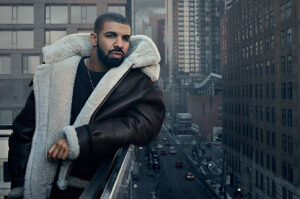
Drake for the “Views” (2016) Album Rollout
By Jules Champion
In the Rap industry the story serves the character rather than the character serving the story. The character, the persona, the aesthetic, is arguably more important than the final product itself. The actions of rappers and their personal lives more-so than in any other genre affect the way and rate in which people consume their music.
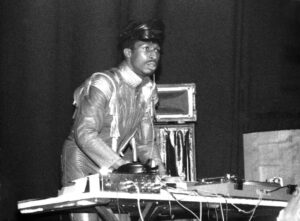
DJ Grandmaster Flash, Pioneer of Rap Music
Starting in block parties in which DJs spun mixes of Funk, R&B, and Soul, the MC’s— later rapper’s—job was to introduce and keep the crowd interested. Eventually these introductions and interjections ran longer and longer, and MCs started to add their own vocal elements to the songs until they were the focal point of the experience; but in an unofficial and heavily saturated scene like Rap, if you didn’t set yourself apart, you were forgotten. In Rap, the regulating party was, and always will be, the crowd, and if the crowd doesn’t like you, or can’t remember you by next set, you’re out. The trail-by-fire nature of these interactions led for the most memorable MCs to survive, while others failed. Technical soundness, musical knowledge, and skill were important, but would be nothing without memorability, without character.
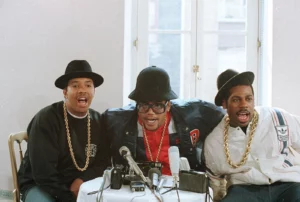
Take a Washington post article from 1986 about Run DMC: “This rap trio, after all, bases its entire persona on unflappable cool, casting a cold eye not only on convention, but on the audience.” Then take the modern marketing of Kanye West as an erratic genius with a penchant for Gospel, Eminem’s marketing as a violent, quick-tempered kid from rural Detroit, or even Jack Harlow’s marketing as a goofy playboy just trying to have fun. Like me, you may be reading this list and saying, ‘well these people really are like that aren’t they? They aren’t characters.’ But then I ask you to compare the way you think about rappers to the way you think about artists of other genres. Yes they have character traits that describe them, but they aren’t polarized as these larger than life figures with the complexity of cartoon characters like rappers are. Each of these Rap artists has marketed themselves through aesthetic means, despite the change in time or music, these artists have remained solid in frffffffffffffffff….[Photo of Run D.M.C. . b .. ].their public image.
Furthermore, the changing of this aesthetic, or living outside of it, has a large effect on your audience. Take rapper Tekashi 6ix9ine’s album “Tattletales” for example. 6ix9ine had marketed themselves as an internet troll trying to steal the spot as New York’s top rapper. Their image was clad in rainbow colors with an implication that they were a member of the Nine Trey Gangsta Bloods. Like Run DMC, they marketed themselves as someone who would never bend to social conventions or the law…
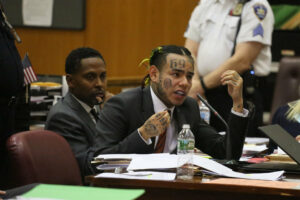
Photo of Tekashi 6ix9ine in Court
and then they snitched. After being arrested for federal racketeering and weapons charges — facing the possibility of life in prison — contrary to what their character has said, 6ix9ine testified against Nine Trey Blood members and named alleged members of the gang. The result of breaking character: “Tattletales” sold ⅓ of its expected units during its release rollout, despite having a hit like “Gooba” on it. Tekashi 6ix9ine broke character and it cost him.
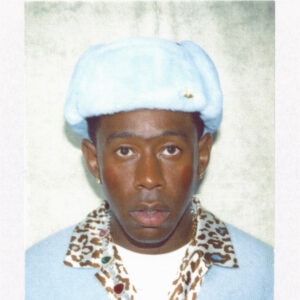
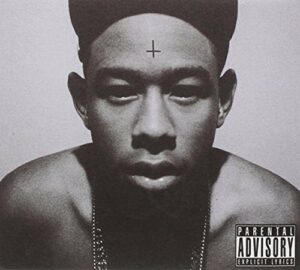
Left- Tyler, the Creator “Call Me If You Get Lost” (2021)
Right- Tyler, the Creator “Goblin” (2011)
To a lesser extent we can even see this with Tyler, the Creator. Shifting from an aggressive, controversial, rapper to a traveling fashion mogul, has cost them some of their original fan base; despite the fact that his fan base was on board with the experimental, changing nature of his music beforehand. The character changed, and the audience responded negatively.
Now with this in mind, what does any of this have to do with Drake?
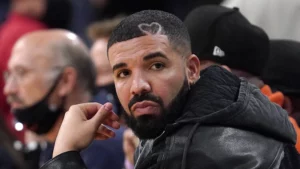
Drake at an NBA game during the release rollout for “Certified Lover Boy” (2021)
Drake has mastered the art of character, of code switching, of genre bending, of bending even the fiber of the past to fit the character of the moment.
In each album, era, moment, whatever you want to call it, Drake has taken something new and made it his own. Despite his original character of an emotional inner city underdog, he’s managed to take from Pop music with “Hotline Bling”, Trap with “Tootsie Slide”, Soul and R&B with the B-side of “Scorpion”, Reggaeton through his feature on MÍA’s “Bad Bunny”, Dancehall with “One Dance”, UK drill with “War”. And with these genre changes he has even taken accents with his poor Jamaican or British accents which he claims aren’t fabricated. Through his 13 year music career Drake has managed to go through so many genres, multiple fake accents, and innumerable cities — repping Los Angeles, Memphis, London, Houston, New York, Dubai, and even St. Thomas in the Caribbean — all without missing a beat.
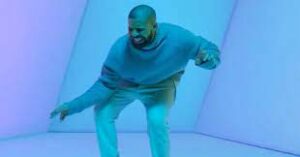
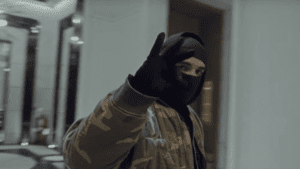

“Hotline Bling” Music Video/”Tootsie Slide” Music Video/”War” Music Video
How he has been able to disobey his original character as a Toronto underdog so many times and switch genres without the same negative affect that hit 6ix9ine or Tyler, the Creator is through the subtle changing of his mythos, of his lore. One minute he is an inner city child, the next an international playboy, then a product of his family lineage in the music industry, then a man of his city— the premiere philanthropist of Toronto, then a corny comedian, then a southern party animal. Drake has managed to take each aspect of himself and transform it into a larger than life character that an audience can consume. Rather than trying something new through the breaking of character, Drake simply creates a new character to market. Even as he creates this new character he forgets he was ever different: when he does Dancehall he forgets he ever spoke without the accent, when he’s in Houston he loves it so much he forgets he claims Toronto. Then, just as the next trend rises and his new interest peaks, he sheds his skin and a new character is born.
Drake has captured a formula that works perfectly for the news cycle of today. He is able to create a character that fits the mold, play that character for the 5 minutes of fame it garners, then is able to switch characters just as it dies out, and as he forgets he was ever different, so do we. Through his ability to create characters we are unable to see anything ingenuine about his music as it fits the genuine character we think we’ve always known.
Through this broad scope he becomes endlessly marketable, that’s how he accomplishes what I previously thought was a sly, calculated, manipulative, shift in his image. Trying to think of a topic to write about, I wanted to expose the ingenuine marketing that allowed Drake to shift characters, but when he does grime it’s really genuine, when he does dancehall it’s really genuine. Does he have any actual attachment to these cultures? Absolutely not. But he is genuinely making the music, he is excitedly riding the trend and turning himself into a character in which that moment can be played through.
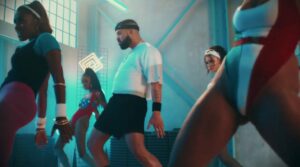
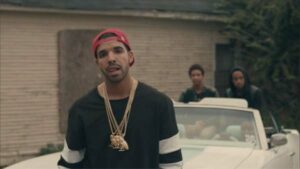
Top- “Way 2 Sexy” (Feat. Future and Young Thug) Music Video/Bottom- “Worst Behavior” Music Video
That is how he takes the on-average short career of a rapper and turns it into a dynasty with no end in sight. Drake as a person is not what we listen to, we listen to the characters he produces for the moment. When we want to feel big and strong the ‘King of the 6’ becomes that medium on which we feel. When we want to feel sensitive we listen to ‘Aubrey Graham’. When we want to feel like a playboy we listen to ‘Champagne Papi’ or ‘Drizzy Drake’. When we’re the underdog we listen to the ‘Kid From the 6’, and for anything in between there is a character there to become that vessel.
The largest artist of our generation, maybe of all time, is a medium more than a musician. Whether this is superficial, important, a sign of shortening attention spans, innovative, or boring is beyond me. Maybe it only adds to the mystery and intrigue that is Drake, but all honesty it doesn’t really matter to me, I just want to keep listening to “Views”.

